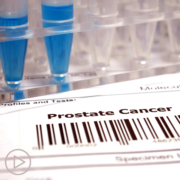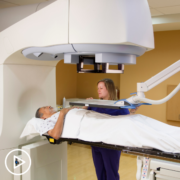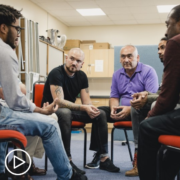How Do Genetic Mutations Impact Prostate Cancer Treatment Options?
How Do Genetic Mutations Impact Prostate Cancer Treatment Options? from Patient Empowerment Network on Vimeo.
How do genetic mutations impact prostate cancer treatment options? Dr. Himisha Beltran shares how information about genetic mutations play into treatment decisions and discusses the role of PARP inhibitor therapies and immunotherapies.
Dr. Himisha Beltran is Director of Translational Research in the Department of Medical Oncology at Dana-Farber Cancer Institute. Learn more about Dr. Beltran, here.
See More From INSIST! Prostate Cancer
Related Resources
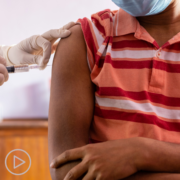
COVID Vaccines: What Do Prostate Cancer Patients Need to Know? |

|
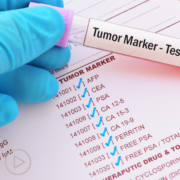
|
Transcript:
Katherine Banwell:
Dr. Beltran, are there gene mutations that affect prostate cancer treatment choices?
Dr. Beltran:
Yeah. So, we’re still really in the infancy of precision medicine in prostate cancer, but we’ve come a very long way. The field has identified several classes of mutations that have treatment implications for men with advanced prostate cancer. One class of mutations is in a pathway we call homologous recombination DNA repair. So, what this really is, is a pathway that consists of multiple genes. BRCA2 is the most common, but there are many within this gene family. And this pathway is important in maintaining DNA repair in a cancer.
There are specific types of mutations that can affect treatment choices for advanced prostate cancer. And there are drugs that specifically target these mutations. So, testing for them in is important in the clinic. The drugs that approved today fall into two classes of medications. One is a class of medicines called PARP inhibitors. These drugs specifically are geared towards patients whose cancers harbor mutations in a pathway called homologous recombination.
So, how these mutations impact the cancer is that they work to repair the DNA of a cell. And if a cancer cell has a mutation or a loss of function of one of these genes, they can still survive because there’s another pathway that can come in and take over. If you can now come in what a drug called a PARP inhibitor, and you block that other pathway, those cells are particularly vulnerable. And they die through a process we call synthetic lethality. And so, this is really the rationale for using a PARP inhibitor specifically for patients whose cancer have an alteration in this pathway.
And I mentioned there are a number of genes that are involved. And so, typically, the way they’re tested for is looking at either the primary cancer or a metastatic biopsy or a liquid biopsy. There’s a number of tests that are available to try to look for these mutations. There is a second class of drugs that is approved for prostate cancer patients based on genetic mutations. And that is a class of drug called immunotherapy. But the drug that’s approved is pembrolizumab. The way this drug works is it’s immunotherapy, meaning that it stimulates the patient’s own immune system to fight the cancer.
And this drug does not work in every patient with prostate cancer. We know it only works in a minority of patients whose tumors have specific vulnerabilities that make them amenable to this. And there a number of ways we test for it. There is something called hypermutation where there’s a lot of mutations in the cancer, mismatch repair deficiency which can be detected by DNA sequencing as well as protein expression. And there’s something called microsatellite instability. And so, these are tests that we are also commonly doing. It’s rare in prostate cancer, less than five percent, but it important because there a class of drugs that approved that can specifically target this.
And then, beyond these two pathways that I refer to, there are a number of emerging therapies that are specifically geared towards mutations in the DNA. So, as we do sequencing, we commonly get more information than just this. There are other common mutations in prostate cancer with clinical trials really geared towards individualizing care based on those mutations, whether it be through targeted therapies or immunotherapies or other approaches. So, the field is really moving very quickly. And so, it’s now quite relevant to test to for mutations where it wasn’t the case really not that long ago.



